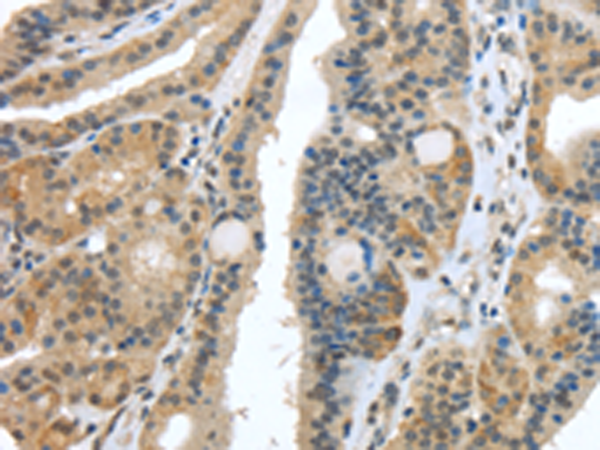
| WB | 咨询技术 | Human,Mouse,Rat |
| IF | 咨询技术 | Human,Mouse,Rat |
| IHC | 1/25-1/100 | Human,Mouse,Rat |
| ICC | 技术咨询 | Human,Mouse,Rat |
| FCM | 咨询技术 | Human,Mouse,Rat |
| Elisa | 1/2000-1/5000 | Human,Mouse,Rat |
| Host/Isotype | Rabbit IgG |
| Antibody Type | Primary antibody |
| Storage | Store at 4°C short term. Aliquot and store at -20°C long term. Avoid freeze/thaw cycles. |
| Species Reactivity | Human, Mouse, Rat |
| Immunogen | Synthetic peptide of human USP28 |
| Formulation | Purified antibody in PBS with 0.05% sodium azide and 50% glycerol. |
+ +
以下是关于USP28抗体的3篇代表性文献,包含文献名称、作者及摘要内容的简要概括:
---
1. **文献名称**:*USP28 regulates MYC stability through TRAF6 in breast cancer*
**作者**:Popov N. et al.
**摘要**:该研究揭示USP28通过去泛素化稳定MYC蛋白,促进乳腺癌细胞增殖。研究利用USP28特异性抗体进行免疫沉淀实验,证实USP28与TRAF6相互作用调控MYC的泛素化降解途径。
---
2. **文献名称**:*The deubiquitinase USP28 controls intestinal homeostasis via p53-dependent pathways*
**作者**:Schülein-Völk C. et al.
**摘要**:本文通过免疫组化(使用USP28抗体)和基因敲除模型,证明USP28通过调控p53蛋白稳定性维持肠道上皮稳态,其缺失会导致肠道炎症和肿瘤易感性增加。
---
3. **文献名称**:*USP28 mediates resistance to EGFR-targeted therapies in lung cancer by stabilizing mutant EGFR*
**作者**:Zhang S. et al.
**摘要**:研究发现USP28通过去泛素化突变型EGFR蛋白,增强其在非小细胞肺癌中的稳定性,导致靶向治疗耐药。Western blot和免疫荧光实验中特异性USP28抗体的应用验证了这一机制。
---
以上文献均聚焦于USP28在癌症中的功能及其抗体的实验应用,涉及分子机制探索和疾病治疗关联。如需具体期刊信息或发表年份,可进一步补充关键词进行检索。
The USP28 antibody is a tool used to study the ubiquitin-specific protease 28 (USP28), a deubiquitinating enzyme involved in regulating protein stability and cellular processes. USP28 belongs to the ubiquitin-specific protease family, which cleaves ubiquitin chains from substrate proteins, counteracting ubiquitin-mediated degradation. It plays a critical role in DNA damage response, cell cycle regulation, and apoptosis by stabilizing key proteins such as c-Myc, p53. and Claspin. USP28 interacts with components of the Fanconi anemia (FA) pathway and the COP9 signalosome, highlighting its involvement in genomic stability and cancer biology.
Research has linked USP28 to cancer progression, where it can act as both an oncogene and tumor suppressor, depending on cellular context. Overexpression of USP28 is observed in certain cancers, such as colorectal and lung cancer, where it promotes cell proliferation by stabilizing oncoproteins like c-Myc. Conversely, USP28 also participates in tumor suppression by stabilizing p53 under stress conditions. This dual functionality makes USP28 a complex therapeutic target.
Antibodies against USP28 are widely used in techniques like Western blotting, immunoprecipitation, and immunofluorescence to detect protein expression, localization, and interactions. They are essential for studying USP28’s regulatory mechanisms, post-translational modifications, and roles in disease models. Specificity and validation (e.g., knockout controls) are critical due to structural similarities among USP family members. These antibodies aid in exploring USP28’s potential as a biomarker or drug target in cancer and other pathologies.
×